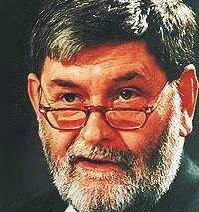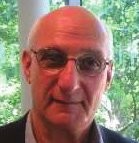Royal Society of NSW News & Events
Royal Society of NSW News & Events
The Royal Society of NSW Forum 2011
"Belief and science: the belief/knowledge dilemma"
Barry Jones and David Malouf
Wednesday 6 April 2011 at 6 pm
The Darlington Centre, University of Sydney
Have scientists become polarised into believers and non-believers? Barry Jones posed this question to David Malouf and members of the Society at the 1190th General Meeting on Wednesday, 6 April 2011. Reflecting upon this, Barry referred to the scientific paradigm that has emerged over the last several hundred years: scientists gather information in order to try to make sense of observed phenomena using rational analysis. Science has evolved to become not so much a matter of belief but rather of acceptance of the most sensible explanation based on the accumulation of evidence. Nonetheless, when major paradigm shifts in scientific thinking take place, there are often eminent experts who disagree and refuse to accept the new theory. This slows down the acceptance of a new paradigm but ultimately in most cases rational thought prevails.
David Malouf pointed out that non-scientists have to rely on what they are told in order to evaluate scientific theories. He pointed out the significant shift since the 18th century when early scientists put their theories to learned academies (such as the Royal Society, London) for expert examination and they determined what was accepted as scientific knowledge and what was rejected. Today, however, with the highly complex issues that society faces there are significant public policy implications that need to be resolved based on expert advice. But what do we do when the experts disagree? We are largely dependent on the media to inform us. This is further complicated because important issues are usually not just scientific in their nature but often have economic and social imperatives that commercial groups, governments and other interests seek to manipulate. Barry commented that the sheer complexity of science has forced scientists to increasing specialisation. Furthermore, scientists are heavily reliant on research grants from government and private enterprise and this has discouraged them from entering into controversies. This is quite different to the era of only 50 or 70 years ago when renowned scientists were not afraid to comment outside their area of specific expertise.
In their final comments, Barry emphasised that the task of a scientist is to analyse inconceivably complex data and make sense of it but the public policy imperatives are driven by media outcomes and necessarily requires the debate to be simplistic. David is fascinated by the rate of change of technology and almost unexpectedly has come to the realisation that the more we know about the complexities of nature, of the human body, the weather and so on, it simply exposes ever more questions. Science has been enormously successful and exciting in bringing an understanding in a world that we know so little about.
Sydney meetings
- Sydney meetings 2024
- Sydney meetings 2023
- Sydney meetings 2022
- Sydney meetings 2021
- Sydney meetings 2020
- Sydney meetings 2019
- Sydney meetings 2018
- Sydney meetings 2017
- Sydney meetings 2016
- Sydney meetings 2015
- Sydney meetings 2014
- Sydney meetings 2013
- Sydney meetings 2012
- Sydney meetings 2011
- Sydney meetings 2010
- Sydney meetings 2009
- Sydney meetings 2008
- Sydney meetings 2007
- Sydney meetings 2006
- Sydney meetings 2005
Hunter meetings
- Hunter meetings 2023
- Hunter meetings 2022
- Hunter meetings 2021
- Hunter meetings 2020
- Hunter meetings 2019
Southern Highlands meetings
- Southern Highlands meetings 2023
- Southern Highlands meetings 2022
- Southern Highlands meetings 2021
- Southern Highlands meetings 2020
Details of events scheduled for the remainder of the current year by the Southern Highlands branch can be found on its website, while details of events of previous years can be found here.



